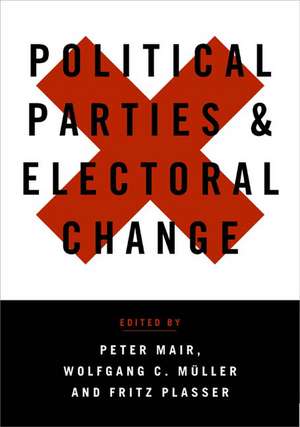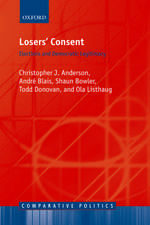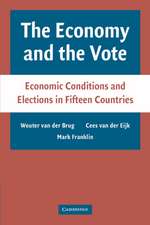Political Parties and Electoral Change: Party Responses to Electoral Markets
Editat de Peter Mair, Wolfgang Müller, Fritz Plasseren Limba Engleză Paperback – 18 mai 2004
Popular disengagement, disaffection, and withdrawal on the one hand, and increasing popular support for protest parties on the other, have become the hallmarks of modern European politics.
This book provides an excellent account of how political parties in Western Europe are perceiving and are responding to these contemporary challenges of electoral dealignment.
Each chapter employs a common format to present and compare the changing strategies of established parties and party systems in Britain, France, Germany, Italy, Austria, Belgium, Denmark, and Ireland.
The result is an invaluable portrait of the changing electoral environment and how parties are interacting with each another and voters today.
Political Parties and Electoral Change is essential reading for anybody seeking a deeper understanding of contemporary electoral politics and of the challenges facing west European party systems.
Peter Mair is Professor of Comparative Politics at Leiden University.
Wolfgang C. M ller is Professor of Political Science at the University of Mannheim and previously taught at the University of Vienna.
Fritz Plasser is Professor of Political Science at the University of Innsbruck.
Preț: 497.13 lei
Preț vechi: 584.86 lei
-15% Nou
Puncte Express: 746
Preț estimativ în valută:
95.13€ • 99.57$ • 79.17£
95.13€ • 99.57$ • 79.17£
Carte tipărită la comandă
Livrare economică 31 martie-14 aprilie
Preluare comenzi: 021 569.72.76
Specificații
ISBN-13: 9780761947196
ISBN-10: 0761947191
Pagini: 296
Dimensiuni: 170 x 242 x 16 mm
Greutate: 0.51 kg
Ediția:First Edition
Editura: SAGE Publications
Colecția Sage Publications Ltd
Locul publicării:London, United Kingdom
ISBN-10: 0761947191
Pagini: 296
Dimensiuni: 170 x 242 x 16 mm
Greutate: 0.51 kg
Ediția:First Edition
Editura: SAGE Publications
Colecția Sage Publications Ltd
Locul publicării:London, United Kingdom
Cuprins
Introduction - Peter Mair, Wolfgang C M[um]uller and Fritz Plasser
Electoral Challenges and Party Responses
Party Responses to the Changing Electoral Market in Britain - Paul Webb
Ephemeral Victories? France's Governing Parties, the Ecologists, and the Far Right - Andrew Knapp
Embracing Dealignment, Combating Realignment - Susan E Scarrow
German Parties Respond
Party Responses to Electoral Dealignment in Italy - Luciano Bardi
Party Responses to the Erosion of Voter Loyalties in Austria - Wolfgang C M[um]uller, Fritz Plasser and Peter A Ulram
Weakness as an Advantage and Strength as a Handicap
Political Parties and Their Reactions to the Erosion of Voter Loyalty in Belgium - Kris Deschouwer
Caught in a Trap
Electoral Fortunes and Responses of the Social Democratic Party and Liberal Party in Denmark - Lars Bille and Karina Pedersen
Ups and Downs
Political Parties in Electoral Markets in Postwar Ireland - Peter Mair and Michael Marsh
Conclusion - Peter Mair, Wolfgang C M[um]uller and Fritz Plasser
Political Parties in Changing Electoral Markets
Electoral Challenges and Party Responses
Party Responses to the Changing Electoral Market in Britain - Paul Webb
Ephemeral Victories? France's Governing Parties, the Ecologists, and the Far Right - Andrew Knapp
Embracing Dealignment, Combating Realignment - Susan E Scarrow
German Parties Respond
Party Responses to Electoral Dealignment in Italy - Luciano Bardi
Party Responses to the Erosion of Voter Loyalties in Austria - Wolfgang C M[um]uller, Fritz Plasser and Peter A Ulram
Weakness as an Advantage and Strength as a Handicap
Political Parties and Their Reactions to the Erosion of Voter Loyalty in Belgium - Kris Deschouwer
Caught in a Trap
Electoral Fortunes and Responses of the Social Democratic Party and Liberal Party in Denmark - Lars Bille and Karina Pedersen
Ups and Downs
Political Parties in Electoral Markets in Postwar Ireland - Peter Mair and Michael Marsh
Conclusion - Peter Mair, Wolfgang C M[um]uller and Fritz Plasser
Political Parties in Changing Electoral Markets
Descriere
This book provides a comparative overview and account of how the parties in Western Europe have perceived contemporary challenges of electoral dealignment and how they have responded - whether organizationally, programmatically, or institutionally.
















